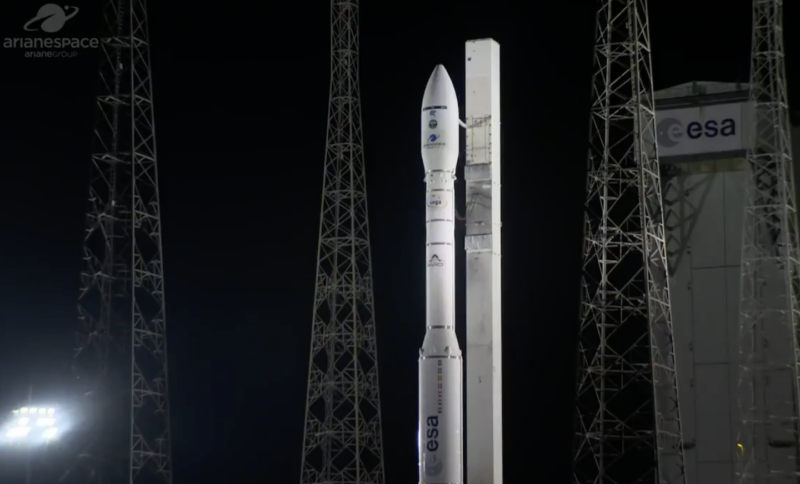Latest News

Arianespace Vega rocket on the pad just before the mission. The mission failed. Screenshot via Arianespace.
Arianespace provided an update on Tuesday after initial investigations into the Nov. 16 Vega launch failure, reporting a cable inversion problem related to the integration of the fourth-stage AVUM nozzle activation system that likely caused the loss of control of the launcher.
Arianespace CTO Roland Lagier said Tuesday in a call with reporters that it was a “production and quality issue, a series of human errors, and not a design one.”
The Vega rocket took off from the Guiana Space Center (GSC) in French Guiana on Monday at 8:52 p.m. ET. But eight minutes after liftoff, after the first ignition of the Avum upper stage, the trajectory deviated and the mission was lost.
“Initial investigations conducted overnight with the available data identified a problem related to the integration of the fourth-stage AVUM nozzle activation system is the most likely cause of the loss of control of the launcher,” Arianespace said in a press release.
Arianespace confirmed the loss of its two payloads, satellites for France and Spain: SEOSAT-Ingenio, an Earth Observation (EO) satellite for Spain’s Center for Development of Industrial Technology (CDTI), and a lightning research satellite called TARANIS for CNES, the French space agency.
The launcher fell in an uninhabited area close to the drop zone planned for the Zefiro 9 stage.
This is the second Vega failure after the July 2019 failure that lost a satellite for the United Arab Emirates, but Arianespace CEO Stéphane Israël said on the call that this failure is not related to the earlier failure.
“We are in a situation which has nothing to do with the previous failure. The previous failure was linked to a weakness of the design,” he said. “Unfortunately we are here on the second failure, which is a quality and a production issue.”
Arianespace and the European Space Agency (ESA) will investigate the issue through an independent inquiry commission chaired by Daniel Neuenschwander, ESA director of Space Transport, and Israël.
“The commission will provide detailed evidence to explain why steps were not taken to identify and correct the integration error. The commission will formulate a road map for the Vega’s return to flight under conditions of complete reliability,” the Arianespace release read.
In addition, Israel said on the press call that Arianespace is not planning to change its upcoming schedule, and it has two launches planned from the Guiana Space Center in French Guiana, and one from the Vostochny Cosmodrome in Russia.
Get the latest Via Satellite news!
Subscribe Now